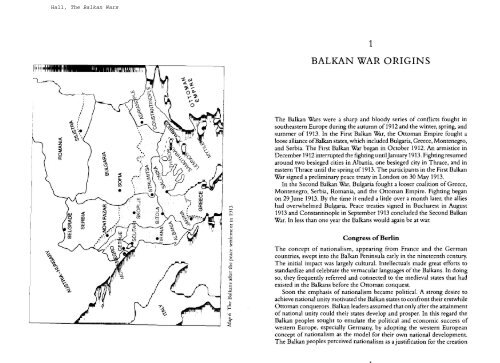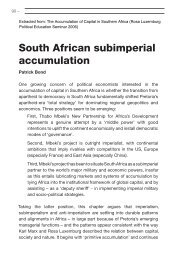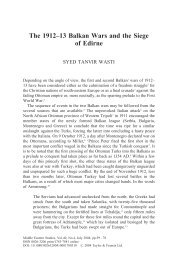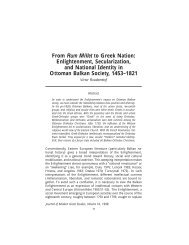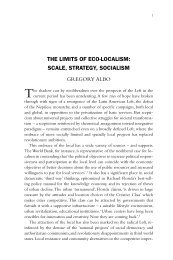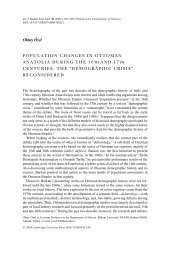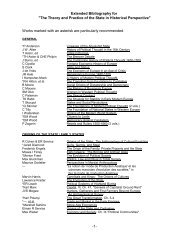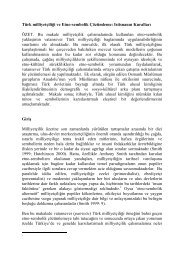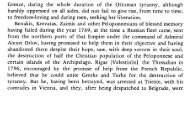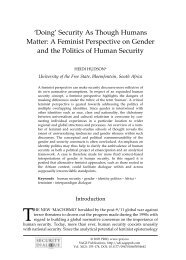Hall, The Balkan Wars
Hall, The Balkan Wars
Hall, The Balkan Wars
You also want an ePaper? Increase the reach of your titles
YUMPU automatically turns print PDFs into web optimized ePapers that Google loves.
THE BALKAN WARS, 1912-1913of specific geopolitical entities. As Vasil Levski, a nineteenth-centuryBulgarian revolutionary activist, explained, "We are a people and want tolive in complete freedom in our lands, there where the Bulgarians live, inBulgaria, Thrace and Macedonia."' This concept of western Europeannationalism displaced the old Ottoman millet system in the <strong>Balkan</strong>s, whichhad permitted each major religious group a significant amount of selfadministration.<strong>The</strong> millet system allowed Moslems, Orthodox, Catholics,and Jews to all live in proximity to each other without intruding upon eachother. It gave the <strong>Balkan</strong> peoples a limited degree of cultural autonomy.<strong>The</strong> Serbs in 1803 and the Greeks in 1821 revolted against their Ottomanoverlords, partially in response to the dimly understood western Europeanethos of nationalism. By 1830 an independent Greek state emerged, and atthe same time an autonomous Serbian state came into existence. <strong>The</strong>Ottomans had conceded Montenegrin autonomy since the eighteenthcentury. This, however, was more in response to the bellicosity and theremoteness of the Black Mountain than to any overt nationalist stirring.<strong>The</strong> successes of the Italians in 1861 and Germans in 1871 in attainingnational unity further inspired the <strong>Balkan</strong> peoples. <strong>The</strong> military aspects ofthe Italian and German unifications served as examples to follow. Each <strong>Balkan</strong>people envisioned the restoration of the medieval empires on which theybased their national ideas. <strong>The</strong> Bulgarians sought the boundaries of the Firstor Second Bulgarian Empires, the Greeks the revival ofthe Byzantine Empire,and the Montenegrins and Serbs sought to recover the extent of the empireof Stephan Dushan. In 1876 Serbia and Montenegro went to war against theOttoman Empire to establish large national states in the western <strong>Balkan</strong>Peninsula. That same year an anti-Ottoman revolt broke out in Bulgaria. In1877 Russia intervened in the <strong>Balkan</strong>s on the side of the Bulgariannationalists. After nine months of unexpectedly hard fighting, the Russiansprevailed. <strong>The</strong> Treaty of San Stefano in March 1878, ending the Russo-Turkish War, created a large independent Bulgarian state and enlarged Serbiaand Montenegro. <strong>The</strong> Treaty of San Stefano fulfilled the maximum territorialaspirations ofthe Bulgarian nationalists. <strong>The</strong> new Bulgaria included most ofthe territory in the eastern <strong>Balkan</strong> Peninsula between the Danube River andthe Aegean Sea. It also included Macedonia. For the first and only time inmodern history, a <strong>Balkan</strong> people had attained all of their national goals.<strong>The</strong> Treaty of San Stefano met a negative response from the leadingcountries of Europe, who had for the past 200 years assumed the prerogativeof arbitrating international affairs. <strong>The</strong>se countries as they existed in 1878,Germany, Great Britain, France, Russia, Austria-Hungary, and Italy, wereknown collectively as the Great Powers. A desire to limit the ambitions ofthe Russian Empire in the <strong>Balkan</strong>s and to impose order on the chaoticconditions in Ottoman Europe, especially on the part of Austria-Hungaryand Great Britain, led the Great Powers to accept the offer of Otto vonBismarck to host a conference to resolve the <strong>Balkan</strong> issues. BismarckBALKAN WAR ORIGINSpromised to serve as an "honest broker, who really wants to do bu~iness."~Bismarck invited representatives of the Great Powers to meet in the Germancapital. <strong>The</strong> subsequent Congress of Berlin was attended by the leadingdiplomats of the time, including Lord Salisbury of Great Britain and CountAndrassy of Austria-Hungary. It greatly diminished the size andindependence of the new Bulgarian state. In place of a large independentBulgaria, the Congress of Berlin established an autonomous Bulgarianprincipality under Ottoman suzerainty, a semi-autonomous Eastern Rumeliaunder the authority of the Ottoman sultan, and returned Macedonia to thedirect rule of the Sultan. This settlement was a catastrophe for Bulgariannationalism. Ivan E. Geshov, who would lead Bulgaria into the First <strong>Balkan</strong>War in 1912, wrote,When we in Plovdiv read in the Times in the ominous month of July1878 the first published text of the agreement, in which a short sighteddiplomacy in Berlin partitioned our homeland, we were left crushedand thunderstruck. Was such an injustice possible? Could such aninjustice be re~ersed?~<strong>The</strong> Congress of Berlin also recognized the full independence of a slightlysmaller Serbia and deprived Montenegro of San Stefano-sanctioned gains inHercegovina, the Sandjak of Novi Pazar and northern Albania. Austria-Hungary advanced into the western <strong>Balkan</strong>s by the occupation of Bosnia-Hercegovina and the Sandjak of Novi Pazar. <strong>The</strong>se territories remained dejure parts of the Ottoman Empire. <strong>The</strong>y also remained objectives ofMontenegrin and Serbian national aspirations. Persistent Greek claims ledto somethingofa corollary to the Berlin settlement. In 1881, the Great Powerssanctioned the Greek annexation of <strong>The</strong>ssaly and part of southern Epirus.<strong>The</strong> Bulgarians soon recovered from the shock of their loses. Geshovwrote to a friend, "Bulgaria is not only truncated but stabbed in the heart.<strong>The</strong> operation, or better to say this series of operations, inflicted uponBulgaria, cause us terrible pains and will cripple us for a long time, but willnot prove fatal to Lord Salisbury, the British advocate of a containedRussia and small Bulgaria, indicated that a big Bulgaria was a matter of time.5<strong>The</strong> Bulgarians were not alone in their frustrations over the Berlin settlement.<strong>The</strong> Greeks, Montenegrins, and the Serbs likewise perceived in the Treatyof Berlin a barrier to their national aspirations. After 1878 all the <strong>Balkan</strong>states strove to overcome the Berlin settlement and realize national unity.<strong>Balkan</strong> national aspirations<strong>The</strong> Bulgarians were the first to act against the Berlin settlement. In 1885,they unilaterally proclaimed the unification of Bulgaria with Eastern Rumelia.<strong>The</strong> Great Powers did not act directly to preserve the Berlin settlement.
THE BALKAN WARS, 1912-1913Serbia, however, with some support from its ally Austria-Hungary, attackedBulgaria later that same year. In the ensuing Serbo-Bulgarian War, theBulgarians successfully defended their unification and administered a sharprebuff to the Serbs. Only the intervention ofAustria-Hungary prevented aBulgarian invasion of Serbia. <strong>The</strong> enmity between these two <strong>Balkan</strong> Slavicstates created an obstacle to the idea of <strong>Balkan</strong> cooperation against the Berlinsettlement and the Ottoman Empire. Nor were relations betweenMontenegro and Serbia conducive toward the realization of national unityDynastic and local rivalries prevented these two Serbian states from mountinga pan-Serb effort against the Ottomans.<strong>The</strong> idea of a <strong>Balkan</strong> alliance extended back to the 1860s, when the Serbiangovernment provided some shelter and assistance for Bulgarian revolutionaries.In 1891, the Greek premier, Kharilaos Trikoupis, had proposed aBulgar-Greek-Serbian alliance. Neither Serbia nor Bulgaria had respondedenthusiastically at that time. <strong>The</strong> Slavic states remained aloof from theirGreek co-religionists because of lack of interest in Greek aspirations in theAegean and because of rivalries with the Greeks over Macedonia. In 1897the Bulgarians and Serbs reached an ephemeral agreement for cooperationin Macedonia.That same year the Greeks made their second assault on the Treaty ofBerlin by attempting to annex Crete. <strong>The</strong> resulting war was over in thirtydays. <strong>The</strong> Ottomans easily deflected the Greek attack. <strong>The</strong> Great Powers,however, intervened to prevent Constantinople from realizing anymeaningful gains from this victory and to maintain the Berlin settlement.<strong>The</strong>y also landed troops in Crete to prevent a Greek occupation and to stopGreek massacres of Moslems. <strong>The</strong> humiliated Greeks did have to cede severalpoints along their frontier in <strong>The</strong>ssaly to the Ottomans. Crete, however,received autonomy under the aegis of a Great Power commission but wasforbidden a union with Greece. <strong>The</strong> Greek failure demonstrated thedifficulties that any one <strong>Balkan</strong> state faced in confronting the fading powerof the Ottoman Empire. It also greatly undermined the confidence of theother <strong>Balkan</strong> states in the abilities of the Greek military.<strong>The</strong> Bulgarians looked to Thrace, the Greeks to the Aegean Islands,especially Crete, and Epirus, the Serbs to Bosnia-Hercegovina, and theMontenegrins to northern Albania as the locations of their aspirations.Bulgarian, Greek, and Serbian claims all overlapped in Macedonia. <strong>The</strong>Ottoman vilayets (provinces) of Salonika and Monastir made up most ofthis fertile region in the center of the <strong>Balkan</strong> Peninsula. All three OrthodoxChristian states considered Macedonia as their own irredenta, based variouslyon cultural, historical, and linguistic claims. Macedonia first became aproblem in 1870, when the Russian government pressured the OttomanTurks to allow the formation of a Bulgarian Orthodox church independentof the Greek Patriarchate in Constantinople. This so-called Exarchateincluded churches in Bulgaria and parts of Macedonia. Eight years later a deBALKAN WAR ORIGINSfacto independent Bulgarian state emerged from the Russo-Turkish War. <strong>The</strong>initial Treaty of San Stefano in March 1878 created a big Bulgaria, whichincluded Macedonia. <strong>The</strong> Treaty of Berlin ofJuly 1878 revised this settlementand returned Macedonia to Ottoman control. Throughout the remainderofthe nineteenth century, the Bulgarians, Greeks, and Serbs contested controlof Macedonia with the Ottoman Turks and among themselves. <strong>The</strong> largestrevolutionary group, IMRO (Internal Macedonian RevolutionaryOrganization) was organized in Salonika in 1893. It adopted the slogan,"Macedonia for the Macedonians," and indeed at times even supported theidea of an autonomous Macedonia within the Ottoman Empire rather thanannexation of Macedonia to Bulgaria. In part to counter IMRO, the Bulgariangovernment established the Supreme Committee or External Organizationin 1895. Even so, the orientation of IMRO was clearly toward Sofia. <strong>The</strong>Greeks organized the Ethniki Etairia in 1894 to further Greek nationalistaims in Macedonia. <strong>The</strong> Serbs had already established the Society of SaintSava back in 1886. All of these groups had educational and propagandisticpurposes. <strong>The</strong>y also served as adjuncts for military organizations. Not to beoutdone, the Ottoman authorities likewise armed those elements in thepopulation favorable to them and promoted educational and Islamicopportunities. <strong>The</strong> competition for Macedonia among the <strong>Balkan</strong> statescreated an obstacle that prevented a <strong>Balkan</strong> alliance directed against theOttomans.Elsewhere, the Montenegrins and Serbs both aspired to the Austro-Hungarian occupied Sandjak (county) of Novi Pazar. <strong>The</strong> Sandjak of NoviPazar was a finger of the Ottoman province of Kosovo, which separatedMontenegro from Serbia. <strong>The</strong> Sandjak of Novi Pazar had a mixed populationof Albanians, Serbs, and Slavic-speaking Muslims. Montenegro and Serbiaalso both claimed Kosovo, which they called Old Serbia because it was thelocation of the epic battle in 1389 between a Serbian-led <strong>Balkan</strong> army andthe Ottoman invaders of the <strong>Balkan</strong> Peninsula. This area had a large Albanianpopulation, as well as Serbs and the usual <strong>Balkan</strong> conglomeration of Turks,Gypsies, Vlachs, and others. <strong>The</strong>se rivalries over Macedonia, Novi Pazar,and Kosovo escalated as the nineteenth century drew to a close.Increasingly, Macedonia became the focus of <strong>Balkan</strong> aspirations. <strong>The</strong>Ottomans preserved their authority in Macedonia by playing the rivalBulgarian, Greek, and Serbian factions against each other. Initially theBulgarians, favored by the Constantinople government, made educationaland cultural gains in Macedonia. <strong>The</strong> Bulgarians further bolstered theirsituation by concluding a military alliance with Russian on 14 June 1902,which provided for mutual aid in case of a Romanian attack."he next yeara revolt directed against Ottoman authority broke out in Macedonia. Led byIMRO, it resulted in defeat and enabled the Greek and Serbian factions toimprove their situations. <strong>The</strong> failure of this revolt caused tremendousexcitement in Bulgaria. As the Bulgarian prime minister at that time, Stoyan
Y e,"-"u= I"=,:SE">;&&$s .-F-5 ",aggzsa2 N OW 5ma$ue,W802 &O'Ez'gss 6"M6 0 & ,=O m M0.- 2$2 & u 0s.; " .s s 2e.5 g& 5 t!- 3 M C ? i M2.5 2 32,se, r 2 9:s 0 C U&*j2O %SZp :,'s 2..,g ow a-oe,2 &* e,2%,e ssgs;.Y u ,: at;>-G"e,e,Y" " Q * a,:PE,ggo& "&Gt:.: 2%'0&*E:u " e,z 5 r.2 8 u0.e E: 5E:u.s5 "3s &2G2'54ww r rs e , o L . m C d -2752 $2;z151+&3am 4'5 o Z.
THE BALKAN WARS, 1912-1913direct annexation of Bosnia-Hercegovina by Austria-Hungary later that sameyear caused great agitation throughout the <strong>Balkan</strong>s. Both the Serbs and theMontenegrins perceived in the Austro-Hungarian annexation of Bosnia-Hercegovina a major setback to their national aspirations. Prince Nikolabombastically called for "sacrifices of blood" to prevent the annexation.I4<strong>The</strong> Serbs were also aware of their own relative weakness and isolation. Torectify this, they began talks aimed at common action against the HabsburgMonarchy. <strong>The</strong> result of these talks was an alliance signed on 22 October1908.15 A major goal of this alliance was a common border in the Sandjak ofNovi Pazar, that finger of Ottoman territory separating Montenegro andSerbia which had been occupied by Austria-Hungary since 1878, in part toisolate Montenegro from Serbia. Although the Austro-Hungarians didevacuate the Sandjak in 1908, the Serbo-Montenegrin alliance did not survivethe Bosnian crisis. <strong>The</strong> old problems of national and dynastic rivalry returnedto render it defunct by late 1909. <strong>The</strong> diplomatic embarrassment of Russiafurther emphasized the need for the Serbian states to find <strong>Balkan</strong> allies.<strong>The</strong> Bulgarians alone in the <strong>Balkan</strong>s obtained some satisfaction from theBosnian crisis. <strong>The</strong>y used the annexation as a cover to declare a formalindependence from the Ottoman Empire. <strong>The</strong> Bulgarians gladly perceivedin the annexation crisis a further erosion of the Berlin settlement. <strong>The</strong> GreatPowers themselves, and especially Austria-Hungary, appeared to participatein the dismantlement of the Berlin settlement, the most important legalobstacle to the realization of <strong>Balkan</strong> national aspirations.<strong>The</strong> year after the Young Turk revolt, a league of Greek officers likewiserebelled and brought about the collapse of the government. <strong>The</strong> new Greekgovernment asserted a more overtly nationalistic policy and attempted totake advantage of the ongoing <strong>Balkan</strong> crisis. It immediately raised the Cretanissue. In 1908, in the aftermath of the annexation of Bosnia-Hercegovinaand the proclamation of Bulgarian independence, Crete had announced aunion with Greece. <strong>The</strong> new government, however, was unable to effectthis union. Ottoman obstinacy and Great Power indifference again frustratedGreek aspirations. <strong>The</strong> next year the withdrawal of the Great Powercommission, which had controlled Crete since 1898, heightened tensionsbetween Greece and the Ottoman Empire. In 1910 only Prime MinisterEleutharios Venizelos' refusal to seat Cretan representatives in the Greekparliament prevented another war between the Greeks and the Ottomans.Albanian stirringsUp until this point the Albanians had staunchly supported Ottoman rule inthe <strong>Balkan</strong>s. <strong>The</strong> majority of Albanians shared the Islamic faith and cultureof the Ottomans. Over the centuries they had acquired certain privilegesfrom Constantinople regarding taxation and the possession of weapons.Albanians made up a majority of the population in the Ottoman provincesBALKAN WAR ORIGINSofJanina, Kosovo, and Scutari and a significant portion of the population ofthe province of Monastir.Albanians initially,hailed the new regime in Constantinople. <strong>The</strong>y hopedit would initiate reforms leading to a recognition of Albanian autonomywithin the empire. <strong>The</strong>se hopes were soon disappointed. <strong>The</strong> newgovernment's centralization policies aroused fears of loss of privilege andeven assimilation in the Albanian areas of the Ottoman Empire. Discontentswept over much of the Albanian-inhabited regions, and open revolt brokeout first among the Catholic tribes in the north but soon spread throughoutthe Albanian regions in the winter and spring of 1910. In May 1911, anAlbanian committee in Vlore (Valona) demanded the unification of theOttoman provinces of Scutari, Janina, Kosovo, and Monastir into anautonomous Albania within the Ottoman Empire. In an effort to restoreOttoman prestige, Sultan Mohammed V visited Kosovo in June 191 1. Thishad little effect on the revolt. <strong>The</strong> government never completely succeededin suppressing this uprising before the outbreak of the <strong>Balkan</strong> <strong>Wars</strong>.<strong>The</strong> growth of an Albanian national self awareness in the Kosovo regionchallenged Serbian pretensions there.'Vhis issue compelled the Serbs toact expeditiously. <strong>The</strong>y feared that Austrian machinations were behind theAlbanian unrest. <strong>The</strong> Greeks were also concerned about the Albanian revolt.<strong>The</strong> development of Albanian particularism infringed on Greek desirada inEpirus and threatened to involve Greece prematurely in a war with theOttoman Empire." Albanian national stirrings also threatened the aspirationsof Montenegro to parts of northern Albania, including the important city ofScutari. Albanian nationalism threatened the national aspirations of Greece,Montenegro, and Serbia. This common problem provided the incentive forthese three <strong>Balkan</strong> countries to act against it and increasingly to act together.By 1911 Nikola, who had granted himself the title of King of Montenegrothe previous year, involved his country in the northern Albanian revolt. Hesupported the rebels against the Ottoman authorities with arms and sanctuaryTo retain control of the last important Islamic region of their Europeanholdings, the Ottomans sent troops to suppress the Albanian revolt. Fightingon the <strong>Balkan</strong> Peninsula then intensified in Albania in 1911.Formation of the <strong>Balkan</strong> leagueAfter the crisis of 1908-9, both the Belgrade and the Sofia governmentsdecided to resolve their national unity issues.'Vhe Serbs sought supportagainst the escalating anti-Serbian policies of Austria-Hungary. <strong>The</strong>Bulgarians remained focused on their aspirations in Macedonia and, to alesser degree, Thrace. Both governments wanted to act before the YoungTurks could implement meaningful reforms.Another reason for the intensification of Bulgarian and Serbian effortson national issues came from radical activists within their own countries.
THE BALKAN WARS, 1912-1913After the failure of the 1903 Macedonian uprising, a revolutionaryorganization, IMRO, had increased its power within Bulgaria and operatedeffectively beyond the control of the Sofia government. Nor did the Bulgariangovernment completely control its own Macedonian organization, theSupremeists. Both ofthese organizations had strong connections within theBulgarian army. Likewise in Serbia, the shadowy military political actionassociation the Black Hand, or Union or Death, functioned within the armyoutside of Belgrade governmental circles. Some senior Serbian officers,including the Chief of Sta& General Radomir Putnik, sympathized withthe Black Hand. Both the Bulgarian and the Serbian organizations weredetermined to pursue national unity with or without government sanction.''<strong>The</strong> governments in Belgrade and Sofia recognized that to maintain controlof their respective national movements, they had to act forcefully towardthe Ottoman Empire.Contact between Belgrade and Sofia increased in 1909. <strong>The</strong>se centeredon the issue of Macedonia. As the then Bulgarian foreign minister, GeneralStefan Paprikov, noted in 1909, "It will be clear that if not today thentomorrow, the most important issue will again be the Macedonian question.And this question, whatever happens, cannot be decided without more orless direct participation of the <strong>Balkan</strong> states."20 After the Bosnian crisis, theSerbs had an additional incentive to make arrangements with the other <strong>Balkan</strong>states. Serbian Foreign Minister Milan Milovanovich explained to GeneralPaprikov in 1909:For us there is another important consideration which speaks for theadvantage of an agreement with Bulgaria. As long as we are not alliedwith you, our influence over the Croats and Slovenes will be insignificant.Outside of the differences of faith, these peoples have to a great degreethe same culture we have. <strong>The</strong>y do not see Serbia as a center, however,able to attract them. It will be something else all together, when you andwe form a powerful bloc. <strong>The</strong>n all Orthodox and Catholic Serbs, Croatsand Slovenes in the neighboring Monarchy will begin inevitably togravitate toward<strong>The</strong> Serbs increasingly saw Yugoslavism as a weapon to use against theirHabsburg adversaries, whom they perceived as the major opponent of aGreater Serbia. This issue illustrated that not all Serbian aspirations were inthe <strong>Balkan</strong>s. Nor did the Greeks, who dreamed ofcontrol ofthe entire Aegeanand Cyprus, and the acquisition of an empire in Anatolia, confine theirinterests to their north. To transcend the <strong>Balkan</strong> Peninsula, the <strong>Balkan</strong> statesfirst had to secure their interests with and against each other.<strong>The</strong>se attempts among the <strong>Balkan</strong> states to overcome the issues thatdivided them coincided with Russian resolve on a more active policy in the<strong>Balkan</strong>s." Since their military defeat by the Japanese in 1905 and theirBALKAN WAR ORIGINSdiplomatic defeat by the Austrians in 1909, the Russians had sought a moreactive role in the <strong>Balkan</strong>s. To this end, St Petersburg began to encourage theformation of an anti-Austrian <strong>Balkan</strong> union. Beginning in 1911, AnatoliNeklyudov, the Russian ambassador in Sofia, and Nicholas Hartwig, theRussian ambassador in Belgrade, labored to bring Bulgaria and Serbia togetheragain in order to solidify the Russian position in the <strong>Balkan</strong>s.In the summer of 1911, after the failure of overtures to the Ottomans toresolve the national issues bilaterally, the Bulgarians decided to settle theMacedonian question. In a speech to the Grand National Parliament (subranie)in 1911, prime minister Geshov broadly hinted at the direction of Bulgarianforeign policy, "I think it is sufficient that you remember the example ofPiedrn~nt."'~ <strong>The</strong> Geshov government contemplated a realpolitik that mightnot result in a San Stefano Bulgaria, but that could obtain for them much ofMacedonia.<strong>The</strong> outbreak of the Italo-Turkish war in September that same yearprovided further incentive for the <strong>Balkan</strong> Slavs to hasten to reach anagreement. One commentator observed that the Italian attack on theOttomans, "broke the ice" for the <strong>Balkan</strong> government^.^^ Obviously the Italo-Turkish war, where one of the Great Powers attacked the Ottoman Empire,further undermined the Berlin settlement. In addition, it diverted theattention of and depleted the resources of the Ottoman Empire to theadvantage of the <strong>Balkan</strong> states.That same autumn, the Bulgarians and Serbs began to exchange proposalsfor an alliance treaty. <strong>The</strong> conservative prime minister Ivan E. Geshov, whoalso held the portfolio for foreign affairs, oversaw the Bulgarian efforts. HisSerbian counterpart was foreign minister Milan Milovanovich, who had alsobecome prime minister in 1911. After three months of negotiations, at timesfacilitated by Russian diplomatic assistance, the Bulgarians and Serbs arrivedat an agreement.25 This agreement, signed on 7 March 1912, provided formilitary cooperation against both the Habsburg and Ottoman Empires andan arrangement for Macedonia. <strong>The</strong> agreement recognized Bulgarianinterests in Thrace and Serbian interests in Kosovo and Albania. It stipulatedthat if autonomy could not be implemented for Macedonia, Serbia andBulgaria would partition that area. <strong>The</strong> Bulgarians were to obtain outrightsouthern Macedonia, including the towns of Ochrid, Prilep and Bitola.Northern Macedonia, including the important town of Skoplje, was assignedby the agreement to a "disputed zone," with the Russian tsar acting asarbitrator if the Bulgarians and Serbs could not arrive between themselvesat a suitable arrangement for the allocation of the territory. Most Bulgariansunderstood the establishment of an autonomous Macedonia as being a steptoward the Bulgarian annexation of all Macedonia. If this did not prove tobe possible, then they could fall back on the provisions in the treaty fordivision of Macedonia. Although the treaty indicated that Austria was a~otential enemy, its main thrust pointed at war between the <strong>Balkan</strong> Slavicallies and the Ottoman Empire.
THE BALKAN WARS, 1912-1913<strong>The</strong> Bulgarians were by and large satisfied with this arrangement. <strong>The</strong>yobtained Serbian recognition for their claims to most of Macedonia. <strong>The</strong>ywere confident that their liberator and traditional friend Russia would ensurein the end that the "disputed zone" would also come to Bulgaria. <strong>The</strong> Serbs,however, were not as enthusiastic about the treaty. Elements in the Serbianarmy, including the chiefof staff; General Radomir Putnik, were dissatisfiedwith the treaty, and the leader of the Serbian Radical Party, Nikola Pashich,did not like it. He wrote, "in my opinion we conceded too much, or bettersaid, we abandoned some Serbian areas which we should never have daredto abandon even if we were left without an agreement."26 <strong>The</strong> source of thisdissatisfaction was Macedonia. <strong>The</strong> agreement with Bulgaria gave Serbia aclear claim only to Kosovo and the Sandjak of Novi Pazar. <strong>The</strong>y would onlyacquire the "disputed zone," the northwestern corner of Macedonia, as thebeneficiaries of Russian arbitration. Many Serbs had aspirations to allMacedonia. Milovanovich's premature death in July 1912 removed a forcefor moderation in the Serbian government. Six weeks after his death, theardent nationalist Nikola Pashich became prime minister and minister forforeign affairs. Never a strong partisan of the agreement with Bulgaria,Pashich remained a strong advocate of a maximalist Serbian agenda.Even before the finalization of arrangements between the Bulgarians andthe Serbs, the Sofia government began to pursue talks with Athens toward aBulgaro-Greek alliance. <strong>The</strong> Greeks had long been interested in anarrangement with Bulgaria directed against Turkey. In the aftermath of itshumiliation in the Cretan crisis of 1909, the government in Athens madenumerous overtures to S~fia.~' <strong>The</strong>se proposals continued until the autumnof 1911, when the Bulgarians, whose negotiations with the Serbs wereongoing, at last responded positively. Negotiations between Greece andBulgaria continued until the signing of a treaty in Sofia in May 1912.2H <strong>The</strong>treaty provided for political and military cooperation against the Ottomanempire without stipulating any specific division of Ottoman territories. Thiswas largely the fault of the Bulgarians. <strong>The</strong>y sought an alliance with theGreeks mainly to secure the assistance of the Greek navy against theOttomans. <strong>The</strong> Bulgarians had little faith in the military abilities ofthe Greeksand were confident that their own larger and stronger army could seize theterritories in Macedonia they sought before the Greeks could arrive. Thisarrogant attitude would have important repercussions.During the summer of 1912, the Greeks then concluded "gentlemen'sagreements" with Serbia and M~ntenegro.~~ <strong>The</strong> Serbs and Greeks hadnegotiated throughout the summer of 1912. Although the Greeks submittedthe draft of an alliance proposal on 22 October, the arrangements wereincomplete by the time of the outbreak of war, because of issues such as thedivision of conquered territory and the obligation of Greece to aid Serbia incase of Austro-Hungarian intervention. <strong>The</strong> Greeks had no firmcommitments from any of the Slavic <strong>Balkan</strong> allies, other than the agreementto fight the Ottomans.BALKAN WAR ORIGINSAfter the signing of the Bulgarian-Greek alliance, the Bulgarians and theSerbs separately approached Montenegro. <strong>The</strong> Montenegrins were wellaware of the <strong>Balkan</strong> trend toward confrontation with the Ottoman Empire.Since December 1910, King Nikola had begun to arm Catholic tribesmenin northern Albania and to encourage attacks on centers of Ottoman authorityCoincidentally, he began to approach the other <strong>Balkan</strong> states. In January1911, Nikola proposed to the Serbian ambassador in Cetinje an agreementfor "mutual advance in case of pending events in the balk an^."^" In June1911, he approached the B~lgarians.~' Sofia did not respond until thearrangements with Belgrade and Athens were in place. <strong>The</strong>n the Bulgariansreplied favorably and made an agreement in August 1912." <strong>The</strong> Serbs finallyanswered Nikola in September 1912. <strong>The</strong> two Serbian states signed a politicaland military alliance "aimed at the liberation of Serbs under the Turkishyoke" in Lucerne, Switzerland, on 27 September."With the Montenegrin agreements the <strong>Balkan</strong> League was complete. Itwas a flawed and flimsy diplomatic instrument, accomplished in haste andbased upon self-interest. Bulgaria had formal written alliances with Greece,Montenegro, and Serbia. Serbia had a written agreement with Montenegro.<strong>The</strong> Greco-Serbian and Greco-Montenegrin agreements were merely oralarrangements, difficult to enforce. <strong>The</strong> <strong>Balkan</strong> allies were now ready to fightto complete the process of national unity.By the summer of 1912, Ottoman control ofthe <strong>Balkan</strong>s had deteriorated,especially in Albania and Macedonia. Albanian disorders became morewidespread. <strong>The</strong> bombing of a marketplace in Kochana, Macedonia, byIMRO elements as deliberate provocation resulted in the massacre of overone hundred Slavs there and outraged the Bulgarians. Ottoman efforts todisarm the <strong>Balkan</strong> population came to nothing. <strong>The</strong> Ottoman militaryremained engaged in a losing effort against Italy. One casualty of this stringof difficulties was the Young Turk government. At the end of August ananti-Young Turk faction in the army brought a new government to power.Preparations for warIn pursuit of nationalist goals the <strong>Balkan</strong> states had all built up large militaryestablishments. <strong>The</strong>se armies all received large amounts of the nationalbudgets. <strong>The</strong>y all became strong enough to challenge any constitutional orother political restraint. In addition, they all attempted to pursue strongnationalist agendas of their own. Finally, all of these military establishmentsviewed the possibility of war with the Ottoman Empire as an excitingopportunity. <strong>The</strong> Serbian deputy chief of staff, Colonel Zhivojin Mishich,later remembered,Among all our people, and especially in the military, an unusually broadmood in favor of this war prevailed. Absolutely no one doubted a
THE BALKAN WARS, 1912-1913successful outcome. All conscripts and reserve officers, equipped forwar, happy and proud, passed through the streets of their collectionplaces. Suddenly all previous quarrels among the off~cer corps ceased,all were now brothers, and they went off hand in hand to this holy war.34Similar sentiments prevailed in the armed forces ofthe other three <strong>Balkan</strong>allies. <strong>The</strong> announcement of mobilization generally met with enthusiasmthroughout the <strong>Balkan</strong>s. Only some socialists and the Bulgarian AgrarianParty expressed reservations about the call to arms.<strong>The</strong>re was little enthusiasm for the war on the Ottoman side. Somestudents at the University of Constantinople demonstrated in favor of a warwith the <strong>Balkan</strong> states." Otherwise, the Ottoman capital remainedcomplacent about the prospect ofwar. <strong>The</strong> recent wars in Yemen and northAfrica had blunted much patriotic enthusiasm.To coordinate their efforts against the Ottomans, the Bulgarian and Serbianstaffs met several times. <strong>The</strong>y signed a military convention in Belgrade on29 April 1912. This convention provided for mutual assistance against anOttoman or Romanian attack against Bulgaria and against an Austro-Hungarian attack against Serbia. Subsequent agreements on 2 July and 28September established the basis for the strategic conduct of the war. <strong>The</strong>Serbs had wanted a large Bulgarian force of 100,000 men, the equivalent ofone Bulgarian army, to go to the Macedonian or Vardar theater to insure anoverwhelming victory there. General Fichev, the Bulgarian chief of staff;argued that the eastern or Thracian theater would be decisive and that theBulgarians needed to use the large majority of their forces there. Fichev'sview prevailed. In Belgrade on 28 September the two staffs agreed that themain Bulgarian effort would be in Thrace and that the main Serbian effortwould be in Maced~nia.~WiIitarily this made sense, for the Bulgarians hadthe larger army and could expect to encounter larger Ottoman forces becauseof their proximity to the Ottoman capital. Politically, however, Fichev'sdemands located Bulgarian forces further away from the major Bulgariangoal of the war, Macedonia. Serbian forces were to take and occupy the partsof Macedonia promised to Bulgaria by the March convention. Fichev himselfwas not unaware of the complications this military convention would createfor Bulgarian aspirations. He made reference to Macedonia when he repeateda Bulgarian saying to Colonel Mishich, "It is dificult for any country anarmy passes through."" Serbian occupation of land promised to Bulgariawould become a source of serious conflict.<strong>The</strong> Bulgarians and Greeks also signed a formal military convention inSofia, but not until 5 October, after the beginning of mobilization. GeneralFichev and Minister President Geshov signed for Bulgaria, and CaptainIoannes Metaxas, the future Greek dictator, and Demeter Panas, Greekminister in Sofia, signed for Greece. <strong>The</strong> most important aspect of thisconvention for the Bulgarians was the assurance that the Greek fleet wouldBALKAN WAR ORIGINSdominate the Aegean Sea so that the Ottomans could not transfer troopsfrom Asia Minor to Europe by sea.3H Bulgaria was obligated to commit themajority of its forces in Macedonia unless the Serbs moved into Macedoniawith 120,000 men. In that case, the Bulgarians could utilize the bulk of theirforces in Thrace. Both sides also agreed not to accept an armistice withoutthe prior agreement of the other.<strong>The</strong> Bulgarians had little respect for the prowess of the Greek army andsought no further agreements. <strong>The</strong>y assumed that they would achieve theirgoals without the aid or interference of the Greeks. <strong>The</strong>y should haveattempted to reach a clearer delineation of activities in southern Macedonia,especially around Salonika. Salonika was an obvious Greek destination butonly a fanciful Bulgarian ambition. Adefinite agreement about areas of actionin southern Macedonia might have avoided the race for Salonika and theovert hostility between Greece and Bulgaria that resulted.Once the alliance arrangements were in place, the Bulgarians began toinsist on the implementation of Article 23 of the Treaty of Berlin, whichthey interpreted to mean the establishment of autonomy for Macedonia.<strong>The</strong> Bulgarians perceived in an autonomous Macedonia an advantage thatmight permit the eventual annexation of the entire area. When the Ottomansrefused to consider reforms leading to autonomy in their European provinces,the <strong>Balkan</strong> alliance mobilized. Efforts by the Great Powers to prevent theoutbreak of war were feeble and futile. <strong>The</strong> First <strong>Balkan</strong> War began on 8October 1912 with a Montenegrin attack on Ottoman positions. <strong>The</strong> Greekssignaled their intentions six days later when Venizelos welcomed delegatesfrom Crete into the Greek parliament. This was proof of a union betweenGreece and Crete and a reason, as in 1897, for war. On 17 October the<strong>Balkan</strong> League would respond to the Ottoman declaration ofwar the previousday. <strong>The</strong> <strong>Balkan</strong> Peninsula was aflame, a conflagration that would rage forthe next six years.Military forcesIn many respects all the <strong>Balkan</strong> armies were very similar. <strong>The</strong> all followedEuropean models for training, logistics, communication, and sanitation.Except for Montenegro, they adopted the European General Staff model.Montenegro lacked a General Staff completely. <strong>The</strong>y all fielded a variety ofEuropean-manufactured weaponry. <strong>The</strong>y tended to have older Krupp andnewer Schneider-Creusot guns. <strong>The</strong>re was little standardization forequipment in any of the <strong>Balkan</strong> armies. All the <strong>Balkan</strong> armies perceived thatthe often illiterate peasant infantryman, indoctrinated to some degree withthe appropriate nationalist ideology, was the basis for their military posture.<strong>The</strong> <strong>Balkan</strong> armies were also similar in that they were largely homogenous.None of the four states of the <strong>Balkan</strong> League contained large nationalminorities. Many ofthe existing minorities, such as the Rom (Gypsies), were
THE BALKAN WARS, 1912-1913not expected to serve. A single language of command was a unifying factorin all the armies. Socially they were similar as well, with conscripted peasantsforming the bulk of the enlisted personnel. <strong>The</strong>ir officers were a mix ofprofessionals from varied backgrounds, who often had some foreign training.Reserve officers came from the small professional and commercial classes.Those enlisted personnel who had any education received indoctrinationin the nationalist ideology of the particular country, whether it Bulgaria,Greece, or Serbia, replete with references to medieval glories. Bulgarianslearned of the empires of Tsar Simeon (893-927), Greeks learned about theEmperor Basil I1 (known as the Bulgar Slayer, 976-1025), and Montenegrinsand Serbs learned about Stefan Dushan (1331-55). <strong>The</strong>se individuals hadestablished medieval states that briefly controlled most of the <strong>Balkan</strong>Peninsula. <strong>The</strong> modern national states recognized these earlier ones as linealantecedents and as models to be emulated. Often the junior officers leadingthe men off to war had served as the conveyers of this ideology when theyhad been schoolmasters.<strong>The</strong> Bulgarian army was well trained. Both its infantry and its artillerydrew praise from foreign observers. In 1910 the American military attachein Paris, Major T. Bentley Mott, reported after a trip to the <strong>Balkan</strong>s:<strong>The</strong> Army of Bulgaria is recognized in European military circles as havingexceptional value. It is small, well instructed, and armed with the mostmodern weapons, chosen from the best constructors in Europe. It hasfor years been kept as a sharpened tool, ready for immediate use to defendthe country from powerful neighbors which have repeatedly threatenedor else to undertake, alone or in conjunction with other powers, thecarving out of a larger independence or larger territory from troublesomeneighbor^.^'Its officers had obtained instruction in Russia, Italy, and Germany. Bulgarianstaffofficers were familiar with the current military theories of the day. <strong>The</strong>ysought to implement the ideas ofthe French Colonel Louis de Grandmaisonto carry out the attack quickly and in for~e.~Greek and Serbian officers hadsimilar backgrounds and similar training experiences.<strong>The</strong> Bulgarians had a peacetime army of under 60,000 men, which duringwar expanded to over 350,000. <strong>The</strong> army was organized into nine infantrydivisions, which were armed with the Mannlicher magazine rifle with a shortbayonet, and one cavalry division. In wartime each infantry division includedfour machine-gun sections, which had four 8-mm Maxim guns each. <strong>The</strong>Bulgarian infantry prided itself on its use of the bayonet and on its nighttimeoperations. Each infantry division had attached a field artillery regimentcontaining nine batteries of four guns each. By the time of the <strong>Balkan</strong> <strong>Wars</strong>these were Schneider-Creusot quick-firing 75-mm guns. In addition, theBulgarians had fifty-four six-gun batteries consisting of older Krupp 8.7-cmBALKAN WAR ORIGINSguns, and twenty-four six-gun batteries ofother older guns. It also had twelvefour-gun batteries of Krupp 7.5-mm mountain or light artillery, fourteenhowitzer batteries, and a number of other older guns. For the Bulgarians,the artillery had a dual function. It was necessary to attack and reduce theOttoman fortresses at Adrianople and Lozengrad. Also, since the Russo-Japanese War, the Bulgarians had noted the need for field artillery to utilizeagainst enemy infantry.41 Finally, the Bulgarians possessed a small navyconsisting of six small torpedo boats and the 726-ton torpedo gunboatNadezhda (1898). <strong>The</strong> main purpose ofthe Bulgarian navy was the protectionof the Black Sea coast and the prevention of any blockade that might hamperthe important connection to Russia. When the First <strong>Balkan</strong> War broke outthe Bulgarians had five airplanes of British, French, and Russian manufacture,although they soon acquired seventeen more.<strong>The</strong> Greeks had a peacetime army of about 25,000 men, which withmobilization grew to 110,000 men. In war this army consisted of fourdivisions and six battalions of light infantry (Evzones). <strong>The</strong> infantry weaponwas the 6.5-mm Mannlicher-Schonauer rifle. Each division had a regimentof field artillery attached. <strong>The</strong> Greek artillery regiments consisted of threegroups of three four-gun batteries armed with Schneider-Creusot 7.5-cmhwns. In addition, the Greeks had two mountain artillery regiments with7.5-cm Schneider-Canet guns and one heavy artillery battalion. <strong>The</strong> Greeksalso had three cavalry regiments. At the outbreak of the First <strong>Balkan</strong> War, theGreeks possessed four aircraft. Over the course of the war, they added twosea planes and added floats to one other plane.Among the members of the <strong>Balkan</strong> League, only the Greeks possessed anavy of any size and strength. <strong>The</strong> Greek navy had two main tasks in thewar. <strong>The</strong> first was to guard the mouth of the Dardanelles to interdict Ottomanshipping in the Aegean and Adriatic Seas. This was important as it wouldprevent the Ottomans from reinforcing and resupplying their Europeanforces. <strong>The</strong> Greek ambassador to Bulgaria, Demeter Panas, emphasized thispoint in conversation with Ivan Geshov, the Bulgarian prime minister, onthe eve of the war. Panas stated that Greece could provide 600,000 men forthe war effort. This assertion met Bulgarian incredulity. Panas explained,"We can place an army of 200,000 men in the field and then our fleet willstop about 400,000 men being landed by Turkey upon the southern coast ofThrace and Macedonia, between Salonica and Gallip~li."~~ <strong>The</strong> other taskwas to occupy the Aegean islands still under Ottoman control.<strong>The</strong> pride ofthe Greek navy was the 10,l l8-ton armored cruiser GeorgiosAverov. Built in Italy in 1910, the Averov carried four 23-cm guns and eight12-cm guns. In addition, the Greek navy had eight destroyers built in 1912,eight built in 1906, nineteen old torpedo boats, and a submarine, the Dolphin.It also had some old auxiliary vessels. <strong>The</strong> Greek navy consisted of over11,000 men.4<strong>The</strong> commander of the navy was Rear Admiral PaulKundouriotis.
THE BALKAN WARS, 1912-1913<strong>The</strong> Montenegrins lagged behind the other <strong>Balkan</strong> states in militarytraining, equipment, and education. Essentially the Montenegrin army wasa militia composed of most of the males in the country. In wartime itamounted to 35,600 men. <strong>The</strong>se men were armed with a variety of RussianBerdan and other rifles. <strong>The</strong> Montenegrins had four batteries (twenty-sixguns) of light artillery, and eight and a half batteries (thirty-four guns) ofmountain artillery. <strong>The</strong>se guns were of Italian and Russian origin. Altogetherthe Montenegrins had 126 guns, ranging in size from 65 to 240 mm.44 <strong>The</strong>yalso had a small cavalry unit consisting of one officer and thirty men. <strong>The</strong>Montenegrins depended to a great degree on a martial tradition for the moraleof the army. Among the <strong>Balkan</strong> armies, only the Montenegrins had any recentexperience ofwar. This was largely due to the chronic condition ofbellicositythat existed along the Montenegrin-Ottoman frontier. <strong>The</strong> nature of thefighting tended to season the Montenegrins as individual soldiers, but notas an army.Serbia had a mobilized strength of 230,000 men organized into ten infantrydivisions and one cavalry division. <strong>The</strong> Serbian infantryman carried the 1889Mauser model rifle. Every infantry regiment had a machine-gun sectionconsisting offour 7-mm Maxim guns. <strong>The</strong> Serbs had 228 Scheinder-Creusot7.5-cm quick-firing guns and some older guns. <strong>The</strong> Serbian air forceexpanded from three planes to ten over the course of the First <strong>Balkan</strong> War.In population the <strong>Balkan</strong> states were far inferior to the Ottoman Empire.In 1912 Bulgaria had about 4,300,000 people, Greece 2,666,000, Montenegro250,000, and Serbia almost 3,000,000. <strong>The</strong> Ottoman Empire had around26,000,000 inhabitant^.^^ Of these, around 6,000,000 lived in Europe. In theEuropean part of the empire around 3,500,000 inhabitants were mainlyOrthodox Christian (Bulgarian, Greek, Serbian) and around 2,300,000 wereIslamic. <strong>The</strong>y were of various backgrounds (Turkish, Albanian, Slavic,Circassian, Tartar). This large population was not necessarily an advantage.Even though after 1908 the Ottoman government committed itself toconstitutional reform and extended the obligation to serve in the military toall males in the empire, the army could hardly rely on the numerousBulgarians, Greeks, and Serbs residing within the empire to fight loyallyagainst their co-nationals living in independent states across the frontiers.Many of these Orthodox Christian peoples in the European part of theOttoman Empire would probably assist any invasion by their co-nationals.Nor did Arab, Armenian, and Kurdish soldiers from Asia offer unconditionalloyalty. <strong>The</strong> diverse population of the Ottoman Empire made conscriptionand training difficult. <strong>The</strong> Ottoman army never attempted a sophisticatedarrangement like that devised by the Habsburg army, which had a simplifiedlanguage of command and the oficers made intensive efforts to learn thelanguage of their troops.After their takeover in 1908, the Young Turks attempted to reform theOttoman armed forces. German army officers and British naval oficersBALKAN WAR ORIGINSoversaw some of the reforms. In 1912 the extent and success of the reformsremained problematical. In particular, the development of an officer corpstrained along European (German) lines was open to doubt. <strong>The</strong> Ottomanshad a fairly well-trained and well-equipped regular army (nizam). It alsodepended upon an infantry reserve (redif), which was ill-trained, ill-equipped,and ill-led. Non-Turkish and non-Islamic people made up a significantportion of the redifs. Many of them had little loyalty to the government inConstantinople and would desert during the campaigns of the <strong>Balkan</strong> <strong>Wars</strong>.Only about halfof the Ottoman army was stationed in Europe. <strong>The</strong> otherhalf was scattered throughout the near-eastern regions of the OttomanEmpire, from Anatolia toYemen, where a guerrilla war had smoldered since1904. Some soldiers remained in north Africa in the aftermath of the waragainst the Italians. While the Ottoman high command could draw uponthese Asian forces to obtain decisive numbers in a war against the <strong>Balkan</strong>states, it still faced the immense difficulties of gathering these soldiers fromthe remote corners of the empire and transporting them to the Europeanbattlefields.Like the <strong>Balkan</strong> armies, the Ottoman army had equipment from variousEuropean sources. In Europe they had four corps in Thrace based inConstantinople and three corps in the western <strong>Balkan</strong>s based in Salonika. Inwartime these corps consisted of three divisions, a sharpshooting regiment,a cavalry brigade of three or four regiments, and an artillery regiment. Anartillery regiment had two sections ofthree batteries with six guns per battery,giving thirty-six guns per regiment. Redif units, all infantry, supplementedthe Ottoman division in time of war.Standardization was a problem. <strong>The</strong> infantry was armed with either oneof three different models of the Mauser rifle, some of 7.65 mm others of 9.5mm, or an Henri-Martini gun. Its artillery was mostly made up of Krupp7.5-cm guns. <strong>The</strong> mixed population and the high levels of illiteracy in theOttoman army made the effective operation of modern military equipmentproblematical. This was a problem, especially in the artillery. <strong>The</strong> Ottomanarmy also had several cavalry formations. <strong>The</strong> Ottomans had five airplanesin Thrace at the start of the war. None of them was in condition for flyingwhen war broke out.<strong>The</strong> Ottoman fleet consisted of six armored ships, two armored cruisers,eleven torpedo destroyers, thirty torpedo ships, and nineteen othertransportation and antiquated vessels. Its two modern vessels were the 3,800-ton light cruiser Hamidiye (1903), which had two 6-inch and four 4.7-inchguns, and the 9,250-ton armored cruiser Mecidiye (1904), which had two 15-cm guns and eight 12-cm guns apiece. Together they were probably a matchfor the Geogios Averov, but not separately.<strong>The</strong> Ottomans could not turn all their attention to the troubles in the<strong>Balkan</strong> Peninsula until they ended the war with Italy, which had engagedtheir efforts since 191 1. Although Ottoman-supported tribes in the interior
THE BALKAN WARS, 1912-1913of Ottoman North Africa had fought the invading Italians to a stalemate, theOttoman government in Constantinople decided to resolve this conflict inorder to address the more serious one pending in the <strong>Balkan</strong>s. On 15 October1912, they signed an agreement with Italy at Ouchy, Switzerland, in whichthey ceded Tripoli and Cyrenaica to Italy. In return, the Italians promised tovacate the Dodecanese Islands and Rhodes, which they had occupied duringthe war.46 <strong>The</strong> Ottomans then turned to <strong>Balkan</strong> problems.<strong>The</strong> Ottomans lacked a clear plan for confronting a threat from the <strong>Balkan</strong>Peninsula. When asked about plans, the Ottoman Minister ofwar, HuseyinNazim Pasha, a graduate of the French military academy at St Cyr,nonchalantly replied, "<strong>The</strong>re is a set of plans prepared during the time ofMahmud Sevket Pasha. I am going to obtain and examine them."47 This washardly a sound basis on which to initiate a modern military campaign.<strong>The</strong> Ottoman army did have recent knowledge of war, largely throughfighting in Yemen, fighting the Italians in Ottoman North Africa, and thefighting in Albania. This was of limited value, however.Yemen was remote.Also, because the war in the <strong>Balkan</strong>s immediately followed the one in NorthAfrica, many of the officers and men who gained military experience therewere unable to return before the Ottoman defeats in the autumn of 1912.<strong>The</strong> mountainous topography of the <strong>Balkan</strong> Peninsula made transportationa difficult issue for all the forces involved in the <strong>Balkan</strong> <strong>Wars</strong>. Rail lines,where they existed, greatly facilitated movement. A trunk line extended fromBelgrade to Sofia to Adrianople and to Constantinople. This, the route ofthe famous luxury train the Orient Express, allowed Bulgarian and Ottomantroops to speed to their respective frontiers. <strong>The</strong> other important rail linebranching off from this line in the Serbian city of Nish was a secondarytrunk line that ran down the Vardar valley to Salonika. It connected to anotherline which ran to the main trunk line south of Adrianople. This line, andtwo narrow-gauge lines extending from Skoplje to Mitrovitsa in the Sandjakof Novi Pazar and from Salonika to Monastir, helpcd thc Ottomans somewhatoffset the presence of the Greek fleet in the Aegean. Unfortunately confusionin the Ottoman railroad system hindered mobilization. Many of the non-Moslem railroad employees were di~rnissed.~" <strong>The</strong>ir replacements lackedthe training and experience to facilitate smooth railroad utilization. Thisundermined the Ottomans' ability to move men and equipment to and fromthe battlefields. <strong>The</strong> Greeks also had rail lines extending from Athens totheir frontiers at Larissa and Trikala. Montenegro possessed a short butconvoluted narrow-gauge line extending from the Adriatic port of Antivari(Serbian: Bar) to Vir Pazar on Lake Scutari. This was useful in bringingsupplies from the coast to Montenegrin troops besieging Scutari.In the absence or destruction of rail lines, the combatants had to utilizethe crude roads of the <strong>Balkan</strong> Peninsula for movement. Often roads barelyexisted. Motorized transportation was almost entirely lacking. Most <strong>Balkan</strong>armies depended on horses, donkeys, or oxen to move supplies and theBALKAN WAR ORIGINSwounded. One source noted that for transportation in Montenegro, "failingother agencies, women are employed."4Y Human power helped move suppliesin all the <strong>Balkan</strong> countries. All this meant that movement of men and materialduring the <strong>Balkan</strong> <strong>Wars</strong> was likely to be very slow.Conclusion<strong>The</strong> <strong>Balkan</strong> states, which depended on a national ethos for a sense of powerand legitimacy at the time of their formation, were painfully aware that theywere incomplete. All of these states sought to achieve national unity at theexpense of the increasingly decrepit Ottoman Empire, and in the case of theSerbs and Montenegrins also at the expense of the Habsburg Empire. Onemajor obstacle to the attainment of this unity was the desire of the GreatPowers of Europe to maintain peace and stability throughout the Europeancontinent. <strong>The</strong> Treaty of Berlin embodied this desire. <strong>The</strong> other majorobstacle was the inability of the <strong>Balkan</strong> states themselves to overcome theirown rivalries and claims. <strong>The</strong> defeat of Bulgarian interests in Macedonia in1903 and pressure from Austria-Hungary on Serbia beginning in 1904 ledthese two states to explore mutual cooperation. This tendency to cooperatebecame more pronounced after the Bosnian crisis of 1908-9. Fears ofOttoman resurgence following the Young Turk revolt and demonstrationsof Ottoman weakness in the Italo-Turkish war further accelerated thepreparations of the <strong>Balkan</strong> states toward war. After 191 1, Bulgaria, Greece,Montenegro, and Serbia, with the encouragement of Russia, acted toovercome their intra-<strong>Balkan</strong> rivalries and create a pan-<strong>Balkan</strong> alliance directedagainst the Ottoman Empire. <strong>The</strong> Russians naively assumed this alliancewould serve their interests against the Habsburgs. With the finalization ofarrangements in the summer of 1912, however, its anti-Ottoman intentbecame clear. By then, no amount of posturing by the Great Powers couldprevent the outbreak ofwar. <strong>The</strong> determination of the <strong>Balkan</strong> nations uponwar was stronger than the resolve of the Great Powers to avert war. <strong>The</strong><strong>Balkan</strong> Peninsula would not know peace for over six years.<strong>The</strong> <strong>Balkan</strong> <strong>Wars</strong> of 1912-13 occurred because of the determination ofthe <strong>Balkan</strong> states to resolve their issues of national unity in the face of theweakness of the Ottoman Empire and the opposition of the Great Powers.By 1912 the Great Powers, who had maintained peace in the <strong>Balkan</strong> Peninsulasince 1878 through the mechanism of the Berlin settlement, lacked thedetermination to enforce it when confronted by <strong>Balkan</strong> unity. Because ofthis failure they would find themselves at war within two years.


